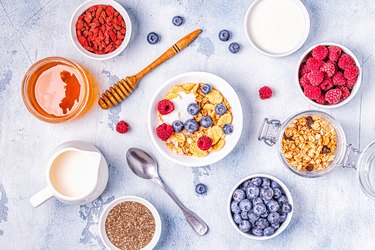
If you're looking to supplement your daily protein intake, you can simply add protein powder to your yogurt. You can try a protein powder Greek yogurt smoothie or a yogurt bowl mixed with protein powder and different combinations of fruit.
An Overview on Protein
Video of the Day
Protein, according to HealthLinkBC, provides the building blocks for repairing cells in protein-based body parts, such as your skin, muscles and nails. At the same time, your body uses protein to produce enzymes and hormones. Protein can be derived from a number of foods, such as meat, poultry and fish, eggs, beans and legumes, soy products and dairy products such as yogurt.
Video of the Day
The amount of protein you need depends on a few factors, including your age, weight, gender and health. An adult man, for example, requires 0.84 grams per kilogram of body weight, while an adult woman requires 0.75 grams per kilogram of body weight, says Victoria, Australia's Better Health Channel.
So an adult male who weighs 80 kilograms (176 pounds) would require 64 grams of protein each day. An adult female weighing 65 grams (143 pounds) needs around 52 grams of protein per day. Exceptions to these requirements include children, athletes and pregnant and breastfeeding women.
Protein is best consumed on a regular basis, as well as soon after exercise. According to Better Health Channel, it's recommended that you consume a sufficient protein source, such as yogurt, along with a carbohydrate to preserve the body's protein balance. Though it should be noted that extra protein is not needed for those who are trying to put on muscle mass.
Read more: 6 Ways Protein Powder is Awesome for You
Yogurt and Protein Powder Smoothie
Another widely consumed source of protein is protein powder. Those who require more protein in their diet may turn to whey protein powder or protein powder recipes mixed in a shake or in yogurt, or better yet: in a yogurt and protein powder smoothie. PennState Extension recommends a strawberry fruit smoothie. Ingredients include:
- 1 cup of skim milk
- 8 ounces low-fat vanilla yogurt
- 10 strawberries
- Six to eight ice cubes
Mix all the ingredients together in the blender and serve (serving size is 1 cup). According to PennState Extension, this smoothie contains 11 grams of protein. You can substitute strawberries with other types of fruit, such as bananas or blueberries or combine different types of fruit together. Moreover, you can use different types of yogurt, such as Greek yogurt, which contains more protein than regular yogurt.
While adding protein powder to your yogurt or smoothie may seem like the best way to stay healthy, keep in mind that protein powders are not FDA-regulated and their long-term side effects are unknown. Furthermore, it may cause intestinal discomfort and can be high in sugar and calories. Though these risks are not highly common, they're important to consider before adding protein powder into your shake, smoothie or yogurt.
Yogurt: A Source of Protein
Yes, you can get protein from adding protein powder to yogurt, but did you know that yogurt itself is a good source of protein? According to HealthLinkBC, 3/4 cup of yogurt is equivalent to about 7 grams of protein. Greek yogurt, has a whopping 14 grams of protein per 3/4 cup.
That's about one quarter of the required daily protein for a woman who is of average weight. As a point of comparison, meat, poultry and fish contain about 21 grams of protein per ½ cup.
And protein isn't the only nutrient yogurt has to offer. It's also rich in calcium, as well as Phosphorus and B vitamins, says the Harvard T.H. Chan School of Public Health. Though much of the health hype surrounding yogurt revolves around its gut-healthy bacterial strains and the implications of consuming them. Yogurt, asserts the Harvard T.H. Chan School, may help increase microbiota gut diversity.
There are, undoubtedly, health benefits to adding protein powder to yogurt, especially for those lacking in protein. It can be said, though, that yogurt itself holds its own when it comes to providing proper nutrients for everyday functioning.